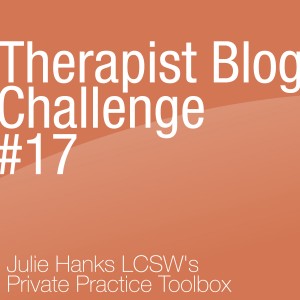 Here's another Therapist Blog Challenge to get your creative juices flowing!
Here's another Therapist Blog Challenge to get your creative juices flowing!
Therapist Blog Challenge #17 deals with how to cope with Social Anxiety Disorder. Those who experience this condition often feel crippling insecurity and fear in social situations. Here's some inspiration to write a post where you explain what SAD is and also offer ways to effectively manage it.
[Headline] Come up with a catchy title for your blog post. You may write your own or use one of the following:
"Get me out of here!": Dealing with Social Anxiety
"Everyone's Staring at Me!": Coping with Social Anxiety
Social Anxiety Disorder: How to Manage It and Enjoy Parties Again!
[Strong Intro] Introduce your readers to the topic, define Social Anxiety Disorder, and tell what the post is going to be about. Here is an example:
While many people consider parties and get-togethers to be fun, others have a much different experience. Some suffer from Social Anxiety Disorder, which causes a person to have excessive and irrational fear of social situations. While others normally enjoy social gatherings, those dealing with social anxiety feel extreme self-consciousness and nervousness. This is way beyond simply shyness; it's a real disorder that can disrupt someone's quality of life. Thankfully, there are steps you can take to minimize the symptoms of Social Anxiety Disorder. Here are a few ways to effectively manage social anxiety:
[Scanable Content] Make your content easy to quickly scan and find the main points.
Therapy
A professional therapist can help someone with social anxiety understand that his/her fears are irrational and overcome them with cognitive behavioral therapy, social training skills, or exposure therapy. A mental health specialist can help provide the tools to move past the limitations someone may feel because of Social Anxiety Disorder.
Deep Breathing Exercises
Focusing on something as simple as breathing can help a person experiencing Social Anxiety Disorder to regain clarity and feel calm and relaxed. When someone is feeling nervous or panicked, there is often a tendency to have quick, shallow breaths. By bringing awareness to one's breath, the heart rate slows down and the person is more in control. Regularly practicing deep breathing/ meditation techniques can help alleviate the effects of Social Anxiety Disorder.
Medication
Medication is a technique to manage symptoms of social anxiety and is usually used in combination with psychotherapy. Anti-depressants can help reduce anxiety and make someone feel like his/herself again. Those who turn to medication for treatment typically experience general anxiety as well. Talk to your doctor to see if medication is right for you.
[Strong Ending Paragraph]
Now, write a short paragraph to tie up your blog post. For this particular subject, it may be good to offer some encouragement that someone suffering from social anxiety can make it through. Below is an example:
Social Anxiety Disorder can be frustrating and discouraging, as you want to enjoy a healthy social life, but know that there is help. You may never become a party animal, but you can effectively manage anxiety in order to feel more comfortable, functional, and secure in social settings.
Additional reminders about the Therapist blog challenge
- Write and post your blog article in the next 2 weeks. If you miss the deadline or you read this article months later, that’s OK too.
- Post a link for this blog challenge in the comment section of this blog post.
- Read, comment, and share other therapist’s articles.
- Tweet your post using hashtag #therapistblog and tag @julie_hanks so I can retweet it.
- Pin it on the challenge Pinterest Board. I’ve invited everyone who posted a comment on the initial blog challenge post as collaborators so you can pin onto the group board.
- Spread the word and invite mental health colleagues to join the challenge. Articles can be added anytime throughout the year.
- Write no more than 600 words, make it easy to read, use a conversational tone, and gear your articles toward your ideal client (not other professionals).
- The goal of a professional blog is to provide value to your website visitors, help them get to know your professional perspective, increase traffic to your private practice website, and build your practice.

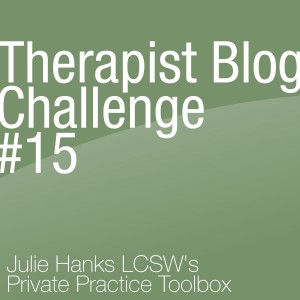
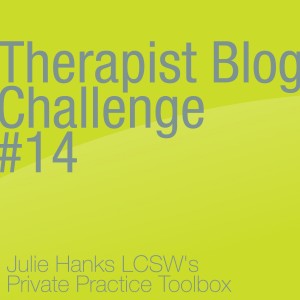
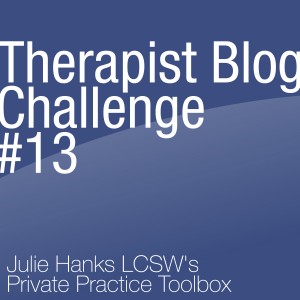
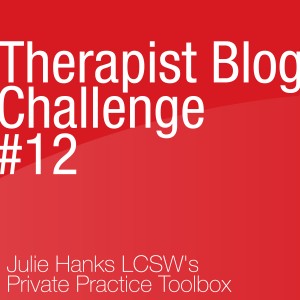
As healers, we genuinely like to do our work. Guiding clients through the therapy process and seeing them make progress is why we do what we do. But if you're in private practice, you know there's a lot going on in the back end and that it's crucial to run an efficient and organized business.